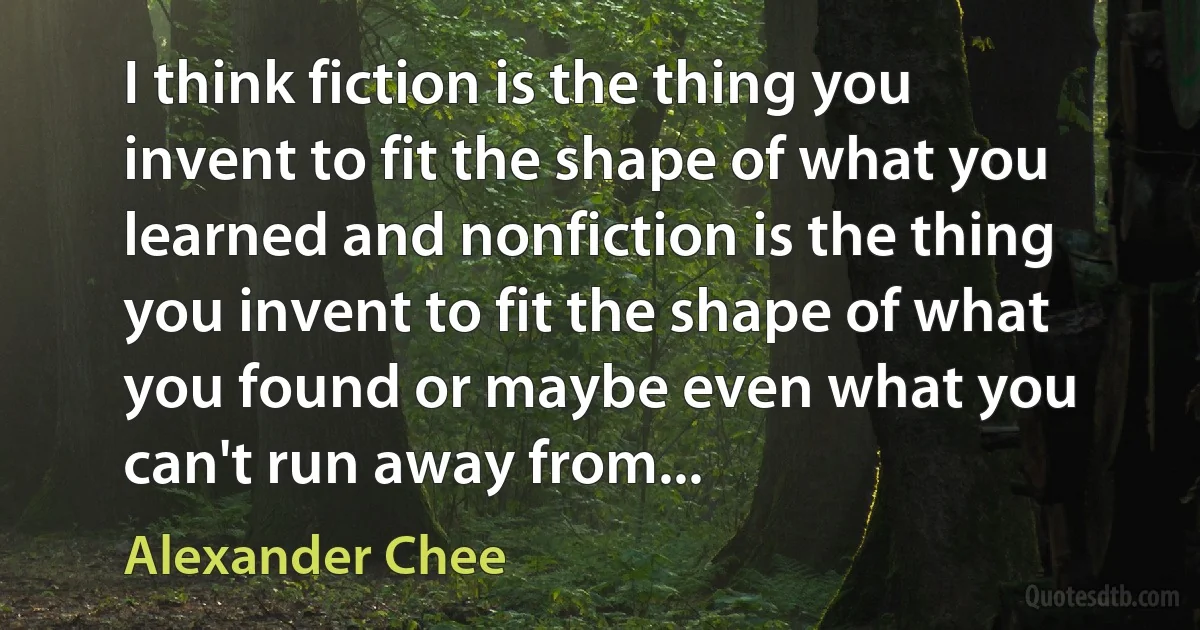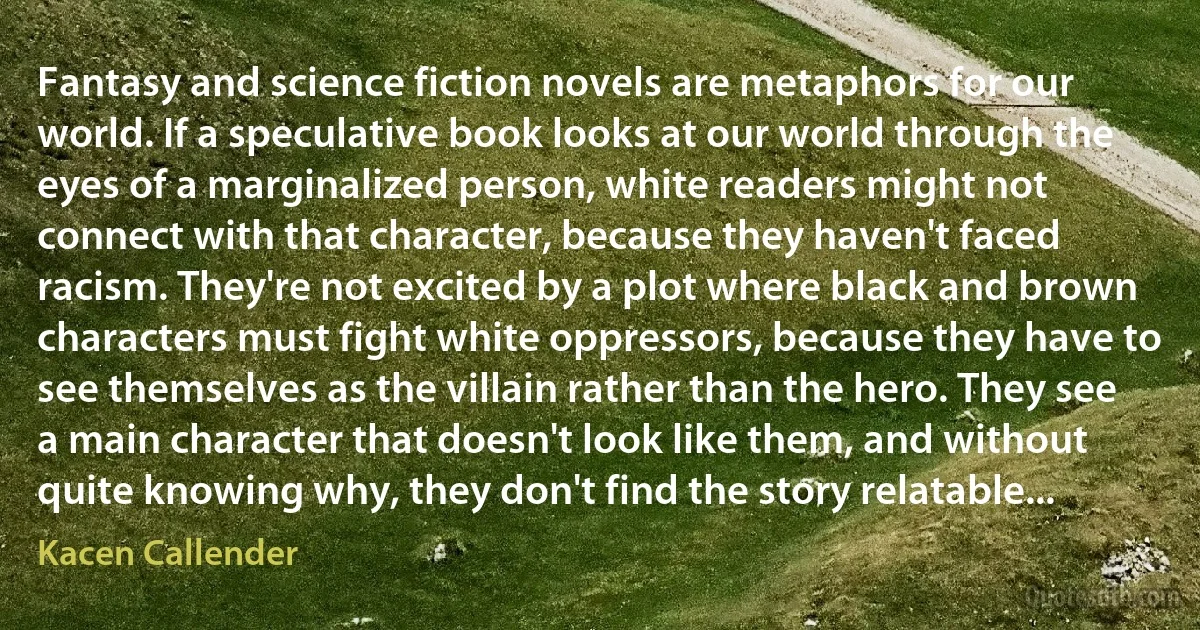Fiction Quotes - page 78
There are writers in commercial women's fiction who get really worked up, and they blog about [the label] and rail against the establishment. I can empathize and understand that frustration, but at the same time, it's a waste of energy. I look at what the readers and writers of the romance genre have done in creating a parallel universe where they sell millions of books to readers who know these writers are good. They don't need the stamp of approval. And what I love about my readers is that they are far more sophisticated, in my opinion, than most literary critics, and far less insecure. At the end of the day, people are reading my books and communicating directly with me, thanks to technology.

Alisa Valdes
I have said that nothing factual that I write or say will be as truthful as my fiction. The life, the opinions, are not the work, for it is in the tension between standing apart and being involved that the imagination transforms both. Let me give some minimal account of myself. I am what I suppose would be called a natural writer. I did not make any decision to become one. I did not, at the beginning, expect to earn a living by being read. I wrote as a child out of the joy of apprehending life through my senses - the look and scent and feel of things; and soon out of the emotions that puzzled me or raged within me and which took form, found some enlightenment, solace and delight, shaped in the written word.

Nadine Gordimer
Camus dealt with the question best. He said that he liked individuals who take sides more than literatures that do. 'One either serves the whole of man or does not serve him at all. And if man needs bread and justice, and if what has to be done must be done to serve this need, he also needs pure beauty which is the bread of his heart.' So Camus called for 'Courage in and talent in one's work.' And Márquez redefined tender fiction thus: The best way a writer can serve a revolution is to write as well as he can.
I believe that these two statements might be the credo for all of us who write. They do not resolve the conflicts that have come, and will continue to come, to contemporary writers. But they state plainly an honest possibility of doing so, they turn the face of the writer squarely to her and his existence, the reason to be, as a writer, and the reason to be, as a responsible human, acting, like any other, within a social context.

Nadine Gordimer
If you take a glass bottle and toss it up into the air so that when it hits the earth it shatters against the ground, and then you take the shards and glue them back together in the shape of a bird, then you no longer have a bottle, you've made something new. Any parts of my personal history I use in my fiction are only interesting to me as the rawest of raw material that I'm shaping into the form of a bird.

Rion Amilcar Scott
Strange reading? It is meant to be. The world is full of romantic, macabre, improbable things which would never do in works of fiction. When those that come within one man's notice are gathered together in a scrapbook, they tell of a world which sobersided folk may not choose to recognize as their own. But it is their own; I have the evidence.

Robertson Davies
There is no reason to suppose that people today feel less than their grandfathers, but there is good reason to think that they are less able to read in a way which makes them feel. It is natural for them to blame books rather than themselves, and to demand fiction which is highly peppered, like a glutton whose palate is defective.

Robertson Davies
Perhaps Algren was our Cassandra: he was right when he argued for the significance of "squalor” and for the literary significance of the vast demographic of the dispossessed. The city was integral to what Algren observed and animated in his best fiction; thanks to Algren and a few others, Chicago framed American conversations about urban reality from the Thirties all the way through the Seventies and Eighties. [... Algren was] the most perceptive and humane novelist produced by Chicago in the 20th century.

Nelson Algren
The whole point of art, for me, is to give us tools to explore feelings or situations or dilemmas that defeat our other ways of making meaning. When a situation is so vertiginous, so ethically complex, so emotionally fraught, that I feel like I'm staring into an abyss-that's when I feel moved to make art, when I feel I need the peculiar tools of fiction to figure out what I think. I mean, to inhabit my bewilderment. I think art is the realm in which we can give full rein to the ambiguity, uncertainty, and doubt that we often feel we have to suppress in other kinds of expression-in our political speech, say. I think an ability to dwell in ambiguity, uncertainty, and doubt is a central virtue of humanness. I think it's crucial to any thinking that might adequately capture the complexity of reality.

Garth Greenwell
[In] "Terminator 2" Arnold Schwarzenegger would portray a good Terminator instead of a bad one. Had this been kept a secret, it would have packed a wallop. Knowing the twist beforehand neither ruins the overall movie-going experience nor damages its integrity, but it's not unlike being aware of the identity of Luke's father while watching The Empire Strikes Back.
It's an exhausting experience and, even 18 years after its release, few films have matched it within the science fiction genre for sheer white-knuckle exhilaration.

James Berardinelli
Shaw's emotional development was one with his intellectual strength. His path led him into the thick of the scrimmage, where more spontaneous natures defend themselves with the usual weapons of malice, humility, bad temper or conceit. But Shaw used the death ray of imperturbability. His feelings were never hurt, his envy never aroused, his conceit was a transparent fiction, he never quarreled.

Jacques Barzun
Today's novelist is not only limited by the thin subject matter of personal experience, but by the pinched clinical conventions of the Health generation. Faced with Othello, say, he would have to divide the man into departments, like a liberal arts course. Race relations - that's still a subject, although of course whites can't write about blacks and vice versa; sexual politics (somehow); Othello's ultimate therapy and decision to endure. Since jealousy is now curable, like TB, we can't have people dying of it anymore. A few rap sessions, some fearless touching, and a new sense of self-worth would have Othello and Iago and Hamlet and Juliet back on their feet in no time; and Fiction struggling.

Wilfrid Sheed
People say kids can't understand the difference between fact and fiction, but that's bullshit. Kids understand that real crabs don't sing like the ones in The Little Mermaid. But you give an adult fiction, and the adult starts asking really fucking dumb questions like 'How does Superman fly? How do those eyebeams work? Who pumps the Batmobile's tires? It's a fucking made-up story, you idiot! Nobody pumps the tires! Grant Morrison: Psychedelic Superhero, 2011.

Grant Morrison
Lafferty deliberately creates the mythic effect through a technique I call effective arcanum, and that rather than examining his work with the conventional tools of science fiction criticism, we need to examine his system - firstly for our pleasure, and secondly so that we may re-create it (because the sign of an authentic religo-magical system is the power of the followers to reproduce the results).

R. A. Lafferty


